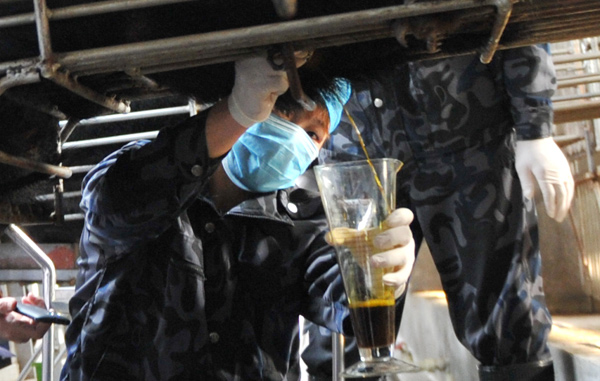Bear bile industry gets bitten by legal action
Chinese wildlife activists have resorted to legal action for the first time to try to end the bear bile industry, which has aroused concern due to the alleged ill treatment of bears.
Animal rights activists, led by Beijing Fengtai YTAHZ Environmental Institute, a Beijing-based NGO promoting environmental protection, brought a lawsuit against the wildlife authority of Fujian province on April 11, requesting that it revoke the certificate issued to a medicine manufacturer that legally allows it to extract bile from live bears.
 |
| A Gui Zhen Tang worker extracts bear bile in Hui'an county, Fujian province, Feb 22, 2012. [Photo provided for China Daily] |
The Gulou district court in Fuzhou received the indictment the next day, but has not replied to the lawyer by Wednesday.
The manufacturer at the heart of the dispute is Gui Zhen Tang, a pharmaceutical company known for harvesting live bear bile and processing it for use in traditional Chinese medicine.
The Asian black bear, the most commonly used species for the extraction of bear bile, is listed as endangered by the World Conservation Union.
Based in Fujian province, the company was founded in 2000 and has one of the largest black bear breeding centers in China.
It came into public view in February 2012 when it announced its intention to seek a listing on the Growth Enterprise Board of the Shenzhen Stock Exchange.
Zang Yun, the lawyer representing the institute, said what backs up the bear bile industry, and the company in particular, are the certificates issued by the authority that gave the industry a legal permit.
It is said that the two licenses, for farming and manufacturing, were issued by Fujian's wildlife authority under the Regulations of Protection of Terrestrial Wild Animals.
"However, issuing the certificates itself is a violation of the Wildlife Protection Law," Zang said.
"The law explicitly prohibits the sale of wild animals and their products except for scientific research or other special purposes."
Gui Zhen Tang's extraction of bear bile certainly does not belong to these special purposes, he said.
"The licenses are therefore not in accordance with the law and should be revoked," Zang added.
Before resorting to legal action, Zang made information disclosure applications concerning the company's operations to the State and provincial forestry authorities, but these were rejected.
The reply from State Forestry Administration said it had rejected Zang's applications on the grounds that neither he nor the institute he represented were interested parties in the case.
As this is the first case of its kind, the qualification issue has sparked a lot of debate.
Wang Canfa, an environmental law professor at China University of Political Science and Law, said: "Everyone has the right to take a legal action against behavior threatening wildlife, according to articles three and five of the Wildlife Conservation Law."
However, Yang Zhaoxia, associate professor at Beijing Forestry University, said the attorney and the institute don't have the "standing" to seek legal relief.
"Chinese law has not recognized environmental rights and interests," he said. "Only by proving that you are a damaged party - that your interests were impaired by the company, can you be recognized as a qualified subject in the lawsuit."
Yang Tongjin from the Chinese Academy of Social Sciences said: "This is a loophole in the current public interest litigation system and environment law.
"The law often lags behind social change and needs to be updated accordingly."
Zang, the lawyer, remains optimistic. He said he has already prepared for all sorts of rejections and defeats. He would go to a higher court if the current one, Gulou district court in Fuzhou city, refused a hearing.





















